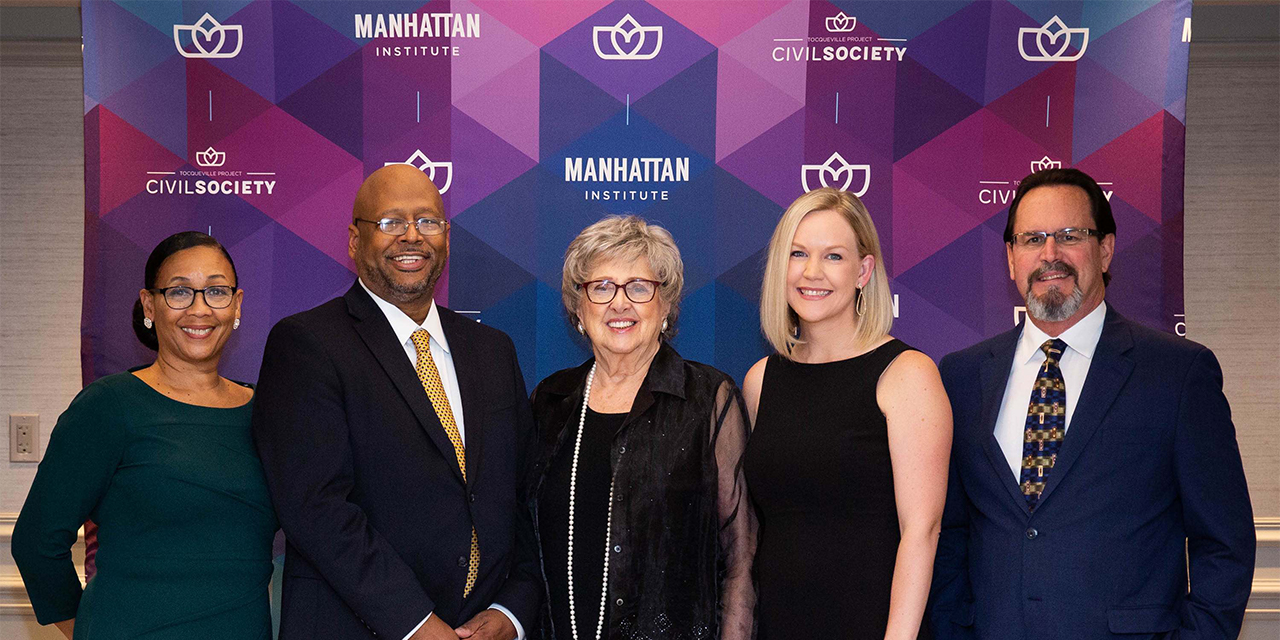While many of us remain cooped up at home, balancing working remotely, taking care of our families, and educating children all in one place, it can be easy to forget that millions of Americans would switch places with us in a heartbeat. The people most severely impacted by the pandemic—aside from those who are suffering from the disease itself—will be those who were already struggling before the crisis, and now aren’t able to work or purchase basic necessities, not to mention health insurance. It is these Americans that civil society groups were there for before coronavirus and will continue to be there for as the nation recovers.
Former winners of Manhattan Institute’s Civil Society Awards are these community groups. They have supported individuals and families through dark times and provided pathways to a more stable and successful future. And while everyone has been affected by Covid-19 in some way, they are doing all they can to be there for those who need them more than ever.
Steve Shelton, Trade Institute of Pittsburgh (TIP):
It has been a challenging and odd time to run a trade school, says Steve Shelton, whose organization provides training and employment opportunities in skilled trades—like masonry, carpentry, and welding—for ex-offenders and at-risk high school graduates. Although TIP had to suspend in-person training in late March to keep students safe, the staff found other ways to engage with students and alumni, while much of Pittsburgh was shut down. As operations shifted, TIP made sure students’ basic needs were being met by calling students every day, holding remote counseling sessions, and providing financial assistance—such as gift cards for food—to students and alumni who were laid off. The unexpected good news: TIP was able to place five students in jobs in recent weeks.
As of Monday, TIP is back with socially-distant classes for about half of its students, and they will slowly build back up to full capacity as the virus subsides. The biggest challenge for TIP’s students right now is focus. They already faced challenges before, and now the Covid-19 crisis has created more—for them and those around them as well. But the TIP team remains optimistic and grateful. Their mission is the same: getting each student a steady job with a livable wage.
Learn more about the Trade Institute of Pittsburgh here. Support their work here.
Kevin White and Kim Turner, Newburgh Performing Arts Academy (NPAA):
Located a little more than an hour from where the coronavirus has hit hardest in New York City, the Newburgh Performing Arts Academy, and its offices at the Boys and Girls Club of Newburgh, remains closed. Over the last several weeks, 62 of the group’s 64 staffers, including founder Kim Turner and executive director Kevin White, have been furloughed, but this hasn’t stopped NPAA from providing quality arts instruction online—including music, drawing, acting, photography, multiple varieties of dance, and other classes—for the children and families in their community. They have also worked with local arts organizations to secure funding and supplies for students in need, so they can continue to participate in online classes.
Through its pre-professional training and community arts programs, NPAA usually educates approximately 800 students each year—helping at-risk youth build self-esteem, improve their academic performance, and develop the discipline necessary to achieve success in all areas of life. In recent weeks, NPAA has offered more than 20 classes each week via Zoom and Facebook thanks to their arts educators who are developing online content free of charge or at a reduced rate. While private, online training is still available to their students via Zoom, NPAA has also streamed dozens of free, public arts classes for the greater community, which have accumulated nearly 25,000 video views on Facebook so far.
Learn more about the Newburgh Performing Arts Academy here. Support their work here.
Florence Phillips, English Language Learners In-Home Program:
As a result of the coronavirus pandemic, Florence Phillips has taken her all-volunteer tutoring program for immigrants and refugees completely online over the last couple months. Rather than being “in-home” they are “at home” conducting English tutoring and GED preparation via Zoom, Skype, FaceTime, and simply over the phone. With a new focus on online tutoring, Phillips’s team has been able to recruit more than 20 new tutors from around the country to teach students on the program’s waitlist.
Unfortunately, while 80% of the program’s students, nearly 700 adults, are able to continue learning, the other 20% don’t have a personal device (computer or cellphone) to use for online instruction or are finding it difficult to practice while their children are home. Phillips is raising funds to provide these students with personal devices for online learning so they do not regress in their English skills.
Learn more about English Language Learners In-Home Program here. Support their work here.
______________________
The Manhattan Institute's Tocqueville Project celebrates and promotes America’s long tradition of civil-society organizations and leaders who are addressing a significant social challenge in their community. With the help of volunteers and private philanthropy, these individuals strengthen our communities and keep our social fabric from fraying. For more information on MI's Civil Society Awards and past winners, visit www.civilsocietyawards.com.
